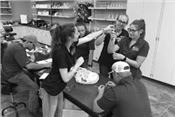|
UK Grain And Forage Center Of Excellence Accepting Applications For Summer 2020 USDA Internship Program

UK 2019 summer intern Bella Usenza, left, demonstrates how to properly use a pipettor
while the other students dissect soybean seed from young soybean pods.
Photo by Carrie Knott, UK grain crops specialist
PRINCETON, KY.
Undergraduate students can apply for a hands-on research internship next summer with the University of Kentucky Grain and Forage Center of Excellence.
The U.S. Department of Agriculture’s Research and Extension Experiential Learning for Undergraduates summer internship program allows students to complete meaningful projects in the UK College of Agriculture, Food and Environment. Internships will be based at the UK Research and Education Center in Princeton or at UK’s main campus in Lexington.
“This is a great opportunity for the next generation of agronomists and scientists to gain experience in an applied field research program and/or a working lab,” said Carrie Knott, UK extension associate professor and internship program coordinator. “This experience will be invaluable to them as they begin their careers.”
Students can choose projects from a variety of agricultural disciplines. Interns will learn from UK scientists how to conduct scientific research, analyze their findings and use their data to develop a professional research poster and report. They will present their posters during the UK Corn, Soybean and Tobacco Field Day in July in Princeton. In addition to conducting research, they will increase their understanding of the Cooperative Extension Service.
Summer 2019 was the second year of a three-year project at UK. Some of the projects conducted last summer included:
McKaylee Copher, a UK junior, studied whether non-lethal doses of dicamba affects the genetics of palmer amaranth under the advisement of Erin Haramoto, UK weed scientist, and Carlos Rodríguez López, assistant professor in the Department of Horticulture. Her research looked at the effects of both direct applications and drift of dicamba on the pigweed. This work is increasingly important as palmer amaranth is already resistant to a number of herbicides, and dicamba-resistant plants were found in Kansas this year. While the genetic part of study is still ongoing, preliminary results found no differences between initial and final plant height and no physical characteristic response to the varying dicamba concentrations.
Hannah York, a sophomore at Murray State University, studied starter fertilizers’ impacts on early-season plant and soil properties under the advisement of Edwin Ritchey, UK extension soils specialist. Her project was to determine if starter fertilizer formulation or rate influenced corn germination, growth, yield or soil electrical conductivity. She found that starter fertilizers containing both nitrogen and phosphorus resulted in taller plants than untreated plots and those treated with only nitrogen. In her study, treatments containing urea ammonium nitrate generally had higher soil electrical conductivity than treatments without. She found starter fertilizer did not influence stand counts.
Gina Merzbacher, a sophomore from Texas A&M University-Kingsville, studied a more efficient way to induce diplodia ear rot in corn in research studies under the advisement of Kiersten Wise, UK extension plant pathologist, and Nolan Anderson, UK staff scientist. Merzbacher inoculated a corn variety susceptible to the disease with several different concentrations of the fungus Stenocarpella maydis. While results are not yet available, her research will help plant pathologists determine the most effective way to inoculate plants, so they can evaluate the effectiveness of various in-season management techniques.
The 12-week internship for 2020 will run from May 26 through Aug. 14. It is open to any undergraduate student, including incoming freshmen and recent graduates, studying at any U.S. university.
The internship is highly competitive with only 10 applicants selected. Funding from the USDA REEU will provide selected interns with a stipend and housing allowance.
The deadline to apply is Feb. 15. The application is available online at http://graincrops.ca.uky.edu/usda-internships or by contacting Knott at carrie.knott@uky.edu. ∆
|
|